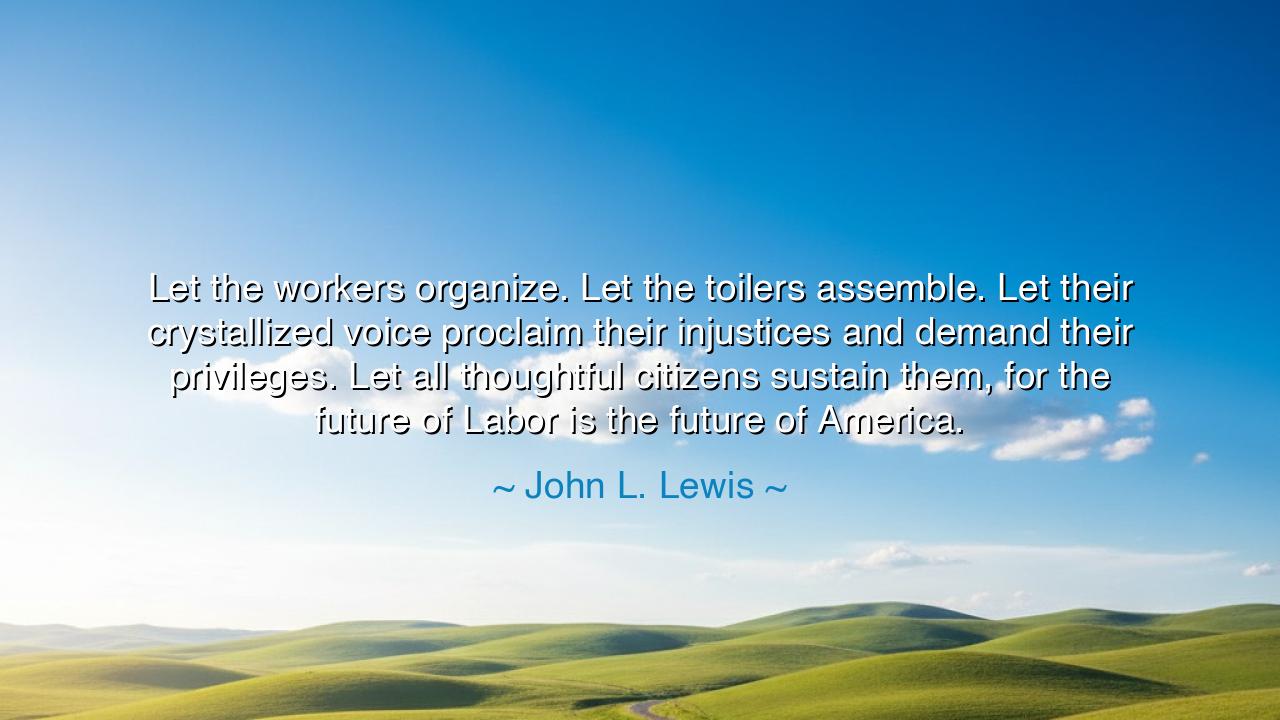
Let the workers organize. Let the toilers assemble. Let their
Let the workers organize. Let the toilers assemble. Let their crystallized voice proclaim their injustices and demand their privileges. Let all thoughtful citizens sustain them, for the future of Labor is the future of America.






In the annals of human history, there have been moments when the voice of the oppressed rises above the clamor of the powerful, proclaiming the need for justice, dignity, and equality. John L. Lewis’s words, "Let the workers organize. Let the toilers assemble. Let their crystallized voice proclaim their injustices and demand their privileges. Let all thoughtful citizens sustain them, for the future of Labor is the future of America," embody the timeless struggle of the working class to gain recognition, fair treatment, and respect. His call to action is not just a plea for social justice, but a recognition of the fundamental role of labor in the creation of a just society, a society where the work of the hands is not undervalued, but celebrated as the very foundation upon which civilization stands.
In the ancient world, the idea of labor as the backbone of society was woven deeply into the fabric of civilization. The Greeks, though often lauded for their philosophical and artistic achievements, were also profoundly dependent on the labor of others. While the elite engaged in the pursuits of thought and politics, it was the slaves and working classes who sustained their lives, cultivating the land, building their cities, and providing the services they needed. Yet, there was an awareness, even in the writings of Aristotle, of the inequalities that permeated this system. Labor, though essential, was often rendered invisible, and its practitioners were viewed as less than human. But within the polis, there were those who understood that the true health of the state depended not on the wealth of the few, but on the well-being of the many, the workers who gave life to the dreams of society.
This tension between the elite and the toilers is echoed throughout history, as workers have continually fought for their rights. In Rome, the plebeians—the common folk—began to demand their rights through the Conflict of the Orders. For centuries, the plebeians, who formed the backbone of the Roman economy, had been denied political power and equality. But over time, they organized and protested, until they achieved reforms that secured their rights and gave them a voice in the governance of the Republic. This struggle for justice was not just about economic conditions, but about dignity, about recognizing the value of all individuals, regardless of their status or wealth. Lewis’s words resonate deeply with the legacy of these early struggles, where labor was seen as the foundation of a just society.
A powerful example of the struggle for labor rights in more recent history can be found in the American labor movement of the early 20th century. John L. Lewis, as a union leader, was at the forefront of organizing the workers in the coal mines, steel mills, and factories that powered the American industrial revolution. His efforts to unite the workers were not merely about securing better wages, but about recognizing the humanity of the worker. Lewis understood that the injustice faced by the working class was a moral crisis, and that the future of America depended on whether the nation was willing to treat its workers with respect and fairness. His work in leading the United Mine Workers of America and advocating for unionization helped to raise the voices of countless individuals who had been silenced for generations.
The lesson embedded in Lewis’s quote is not just one of economic necessity, but of moral imperative. The toilers—the laborers who build, cultivate, and create—are the true architects of society. Their sacrifice and hard work make possible the wealth and prosperity enjoyed by others. Yet, for too long, their voices have been ignored, their rights trampled upon. Lewis calls for a society in which the worker is not just a tool to be exploited, but a vital part of the community, deserving of respect, recognition, and fair treatment. The future of America—and indeed, of any society—is tied to how it values and treats its workers. Without their contribution, no nation can flourish.
In our own time, Lewis’s words continue to resonate. The struggle for fair wages, better working conditions, and workers’ rights is not just a matter of economic equity, but of human dignity. We must remember that when workers organize, they are not merely fighting for their own privileges, but for the very soul of society itself. To ignore their needs is to weaken the fabric of the nation, for it is the labor of the many that sustains the prosperity of the few. In honoring the labor of others, we honor the shared humanity that binds us all.
The call to action is clear: we must support the struggles of the workers in our own time, whether through supporting unions, advocating for fair wages, or simply recognizing the importance of labor in our daily lives. Like Lewis, we must ask ourselves how we can uplift those whose work sustains us, and what we can do to ensure that their voices are heard and their dignity respected. The future of our society, and the future of America, depends on whether we choose to build a world where justice for the laboring masses is not just a lofty ideal, but a living, breathing reality.






AAdministratorAdministrator
Welcome, honored guests. Please leave a comment, we will respond soon